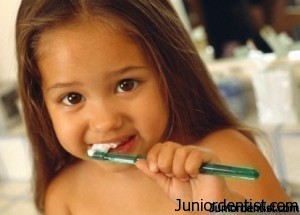 ADA has given some oral hygiene tips to parents, to implement in children so that Cavities can be prevented.
ADA has given some oral hygiene tips to parents, to implement in children so that Cavities can be prevented.
The American Dental Association (ADA) advises parents to teach children the importance of oral hygiene at an early age, so when they grow up they will continue good habits that will contribute to their overall health. Oral hygiene, just like diet and exercise, should be factored together when teaching children how to keep themselves healthy.
For Babies, Toddlers and Pre-Schoolers
- After each feeding, clean the baby’s gums with a clean wet gauze pad or washcloth.
- When teeth start to appear, brush them with a child’s size toothbrush and plain water. At the direction of your dentist, some children under two may benefit from the use of fluoride toothpaste. Look for toothbrushes that carry the ADA Seal of Acceptance. They have been evaluated by the ADA for safety and effectiveness.
- Begin flossing when at least two teeth begin to touch.
- Start dental visits by the child’s first birthday. Make visits regularly. If you think your child has dental problems, take the child to the dentist as soon as possible.
- Brush teeth of children over age two with a pea-sized amount of fluoride toothpaste and make sure to floss daily. Look for toothpastes that carry the ADA Seal of Acceptance. They have been evaluated by the ADA for safety and effectiveness.
- Children should be supervised while brushing to keep them from swallowing the toothpaste.
For School-Age Children and Adolescents
- Until they are six or seven years old, continue to brush your children’s teeth twice a day with a child’s size toothbrush and a pea-sized amount of fluoride toothpaste. Continue to assist with flossing as needed. Look for dental products that carry the ADA Seal of Acceptance. They have been evaluated by the ADA for safety and effectiveness.
- By age six or seven, children should be able to brush their own teeth twice a day but often require supervision until about age 10 or 11, to make sure they are doing a thorough job. Since each child is different, your dentist can help you determine whether your child is brushing and flossing properly.
- Visit your dentist regularly.
- Ask the dentist about dental sealants, a protective plastic coating that can be applied to the chewing surfaces of the back teeth where decay often starts.
- Adolescents may need reminders about practicing good oral hygiene, the importance of regular dental check ups and making nutritious food and beverage choices, the benefit of using mouthguards, and the risks of oral piercings and of tobacco use.
Great posting. I will continue to reference your site in the future.
thank u very much for the information,,i like the site
Thanks for sharing these tips on children’s dental hygiene! I really think it is important for kids to have good dental habits, especially since these habits will most likely stay with them for the rest of their lives. In fact, I’ll be sure to enforce teeth brushing and flossing twice a day. If I am consistent enough, hopefully I’ll help them develop good habits.